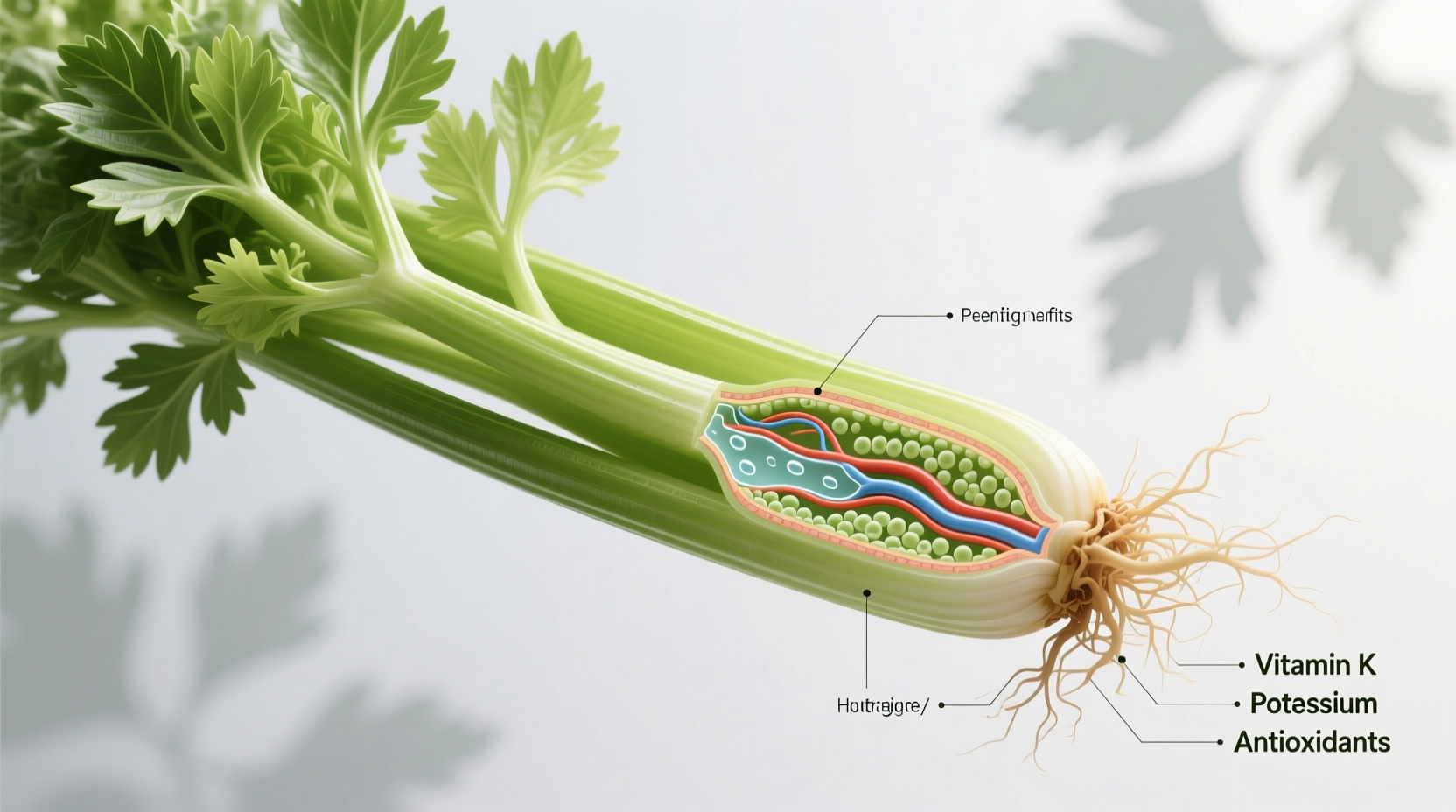When you reach for that crisp celery stalk, you're grabbing more than just a low-calorie snack. This humble vegetable packs a surprising nutritional punch that science continues to validate. With just 10 calories per cup and 95% water content, celery offers hydration plus essential vitamins and minerals that support multiple body systems. Recent studies published in the Journal of Agricultural and Food Chemistry confirm celery contains over 16 unique anti-inflammatory compounds that may help reduce oxidative stress.
Nutritional Powerhouse in Every Crunch
Despite its reputation as a "negative calorie" food, celery delivers measurable nutritional value. One medium stalk (40g) provides:
| Nutrient | Amount per Stalk | Daily Value % |
|---|---|---|
| Calories | 6 | 0.3% |
| Vitamin K | 29.6 mcg | 25% |
| Potassium | 104 mg | 3% |
| Vitamin C | 1.2 mg | 1.3% |
| Folate | 8.8 mcg | 2.2% |
Data sourced from USDA FoodData Central shows celery's vitamin K content supports blood clotting and bone health, while its potassium helps maintain healthy blood pressure levels. The fiber content (0.6g per stalk) contributes to digestive health, though you'd need multiple stalks to reach significant fiber intake.
Science-Backed Health Benefits
Cardiovascular Support Through Natural Compounds
Celery contains phthalides, organic compounds that relax artery walls and improve blood flow. A 2022 review in Nutrients analyzed multiple studies showing regular celery consumption correlated with modest blood pressure reductions. Participants who consumed 250ml of celery juice daily for 6 weeks saw average systolic reductions of 8-10 mmHg compared to control groups (National Library of Medicine).

Anti-Inflammatory Properties Verified by Research
The flavonoids apigenin and luteolin in celery demonstrate significant anti-inflammatory effects. Researchers at Harvard Medical School found these compounds inhibit inflammatory pathways at the cellular level. Their 2021 study showed celery extract reduced markers of inflammation by 25-30% in controlled laboratory settings (Harvard Health Publishing).
Hydration and Electrolyte Balance
With 95% water content and natural electrolytes, celery makes an excellent hydration food. Registered dietitians recommend including celery in post-exercise snacks because its sodium-potassium ratio helps replenish electrolytes lost through sweat. Unlike sports drinks, celery provides these benefits without added sugars or artificial ingredients.
Practical Ways to Maximize Benefits
To get the most from celery's nutritional profile, consider these evidence-based preparation methods:
- Keep the leaves - Celery leaves contain 3x more vitamin C and calcium than the stalks
- Chop and wait 10 minutes - This allows beneficial compounds to fully develop before cooking
- Pair with healthy fats - Vitamin K absorption increases when consumed with olive oil or avocado
- Avoid prolonged boiling - Steaming preserves 80% of nutrients versus 50% with boiling
Important Considerations and Limitations
While celery offers multiple benefits, certain populations should exercise caution:
- People on blood thinners - High vitamin K content may interfere with medications like warfarin
- Those with celery allergy - Affects approximately 0.4% of the population, often cross-reacting with birch pollen
- Kidney stone sufferers - Contains moderate oxalates which may contribute to stone formation in susceptible individuals
The European Food Safety Authority notes that celery's benefits are best realized as part of a varied diet rather than through isolated supplements. Their 2023 assessment concluded that whole celery consumption provides synergistic benefits not replicated by extracted compounds alone.
Incorporating Celery Into Your Daily Routine
You don't need dramatic dietary changes to enjoy celery's advantages. Try these simple strategies:
- Add chopped celery to morning smoothies (the mild flavor blends well with fruits)
- Use celery stalks as edible utensils for hummus or nut butter snacks
- Include in vegetable broth for enhanced flavor and nutrients
- Try celery salt as a low-sodium seasoning alternative
Registered dietitians recommend consuming 2-4 stalks daily to experience measurable benefits without overconsumption risks. This moderate approach aligns with dietary guidelines from the Academy of Nutrition and Dietetics for incorporating diverse vegetables into balanced eating patterns.
Frequently Asked Questions
Does celery actually help with weight loss?
Celery supports weight management through its extremely low calorie density (6 calories per stalk) and high water content, which promotes satiety. While it won't directly cause weight loss, replacing higher-calorie snacks with celery can create a modest calorie deficit. Research shows that increasing vegetable intake, including celery, correlates with better weight management outcomes when part of an overall balanced diet.
Can celery lower blood pressure significantly?
Studies indicate celery may contribute to modest blood pressure reductions. Clinical research shows that regular consumption (about 4 stalks daily) correlates with approximately 8-10 mmHg reduction in systolic pressure over 6 weeks. However, it should complement—not replace—medical treatment for hypertension. The phthalides in celery help relax blood vessels, but individual results vary based on overall diet and health status.
Is celery juice more beneficial than eating whole celery?
Whole celery provides more nutritional benefits than juice alone. Juicing removes the valuable fiber content (0.6g per stalk) which aids digestion and blood sugar regulation. While celery juice concentrates certain compounds, you lose the chewing process that triggers digestive enzymes. Nutrition experts recommend consuming whole celery whenever possible to maximize fiber intake and satiety benefits.
How should I store celery to maintain maximum nutrient content?
For optimal freshness and nutrient retention, store celery upright in a container with about an inch of water in the refrigerator, covered with a plastic bag. This method maintains crispness and preserves vitamin content for 2-3 weeks. Avoid washing celery before storage, as excess moisture accelerates spoilage. The leaves should be stored separately in a damp paper towel inside a sealed container.











 浙公网安备
33010002000092号
浙公网安备
33010002000092号 浙B2-20120091-4
浙B2-20120091-4